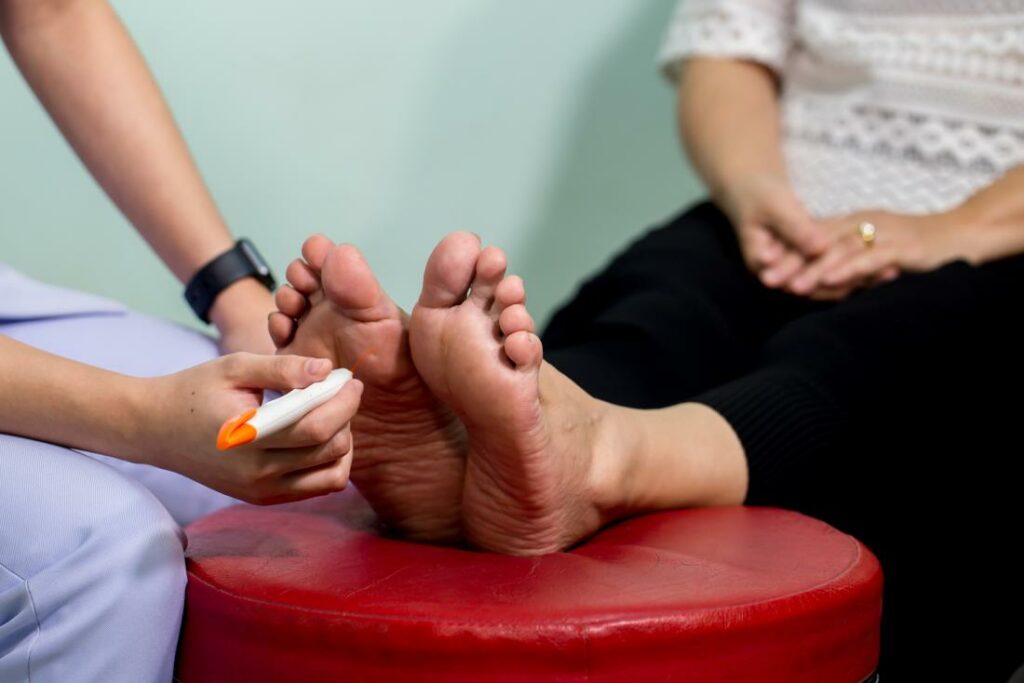Diabetes is a precarious disease that eats up a whole body if not treated. When a secondary lifestyle is the only option in this modern tech-oriented world, most of us start eating unhealthy, which in turn leads to various metabolic syndromes such as diabetes. From macro to microvascular, complications of diabetes are multitudinous. One of these complications is neuropathy. Neuropathy, also known as peripheral neuropathy, refers to nerve damage in the hands, feet, arms, or legs. This article will tell you all about “the treatment of neuropathy in the legs and feet”.
Contents
Neuropathy
Neuropathy is a condition that affects the nervous system, which includes the brain and spinal cord. The nervous system is responsible for sending signals to the body, and when it’s not functioning properly, it can cause a variety of problems.
There are many different types of neuropathy, but the most common is diabetic neuropathy, which affects people with diabetes. Diabetic neuropathy can cause pain, numbness, tingling, and weakness in the legs and feet. It can also lead to problems with balance and coordination.
There are many causes of neuropathy, but the most common is diabetes. 60%-70% of people with diabetes have mild to severe forms of nervous system damage. Diabetic neuropathy is caused by high blood sugar levels damaging the nerves. This can cause pain, tingling, and numbness in the legs and feet. Other causes of neuropathy include alcohol abuse, certain medications, inflammation, infections, and nerve damage from injury or surgery.
When Should I Seek Treatment?

You should definitely consider talking to your healthcare provider if you’re seeing any symptoms. Symptoms depend on the type of nerves affected, but the most common symptoms associated with legs and feet are listed below:
- Numbness, tingling, pain, weakness, and loss of sensation.
- Sharp, jabbing, throbbing, or burning pain
- Muscle weakness
- Lack of balance and coordination
- In some cases, people may also experience changes in blood pressure or temperature in the affected area.
Neuropathy is often caused by diabetes, but it can also be the result of other conditions such as alcoholism or certain medications. Treatment will vary depending on the underlying cause but may include pain relief medication, physical therapy, and lifestyle changes.
Can Neuropathy Be Cured Or Treated?

There are a number of different options available for the treatment of neuropathy in the legs and feet, depending on the underlying cause. In some cases, treatment may be as simple as managing the underlying condition that is causing neuropathy.
For example, if neuropathy is caused by diabetes, treatment will focus on keeping blood sugar levels under control. In other cases, more specific treatments may be necessary.
Medications
There are many different types of medications that can be used to treat neuropathy, and the best course of treatment will vary depending on the individual. Some common medications used to treat neuropathy include:
- Antidepressants: Tricyclic antidepressants (TCAs) and selective serotonin reuptake inhibitors (SSRIs) are commonly used to treat neuropathic pain. TCAs work by blocking the reuptake of norepinephrine and serotonin, while SSRIs block the reuptake of serotonin.
- Anti-seizure medications: These medications are often used to treat neuropathic pain because they help to reduce neuronal hyperexcitability. Commonly prescribed anti-seizure medications include gabapentin and pregabalin.
- Pain relievers: Over-the-counter (OTC) pain relievers such as acetaminophen and ibuprofen can be effective in treating mild neuropathic pain. More severe cases may require prescription-strength medication such as tramadol or hydrocodone/acetaminophen.
Side-Effects
Some of the most common side effects seen with neuropathy medications include dizziness, drowsiness, nausea, vomiting, constipation, diarrhea, headache, dry mouth, blurred vision, and weight gain. Less common side effects include anxiety, depression, difficulty sleeping, tremors, joint pain, muscle pain, skin rash, and sexual dysfunction.
While most side effects are relatively minor and will go away on their own with time or by adjusting the dose of the medication, there are some more serious side effects that should be reported to your doctor right away. These include shortness of breath, chest pain, irregular heartbeat; seizures, sudden changes in vision, fainting, or swelling of the face, hands feet, ankles, or lower legs. If you experience any of these serious side effects while taking medication for neuropathy treatment, seek medical attention immediately.
Therapies
There are many different therapies that can be used to treat neuropathy. Depending on the severity of the condition, some patients may only require simple pain relief measures while others may need more aggressive treatment. Some common therapies for neuropathy include:
Here is a comprehensive list of some of the most common and effective physical therapy treatments:
- Electrical Stimulation: This therapy involves the use of electrical currents to stimulate nerve endings and help reduce pain.
- Massage Therapy: Massage therapy can help to improve circulation and relieve muscle tension.
- Exercise: Exercise is an important part of any treatment plan for neuropathy. A regular exercise routine can help to reduce pain, improve circulation, and promote nerve health.
- Hot/Cold Therapy: The use of hot or cold compresses can help to provide relief from pain and inflammation.
- Ultrasound Therapy: This therapy uses sound waves to stimulate the nerves and improve circulation.
How Can I Prevent Neuropathy?
There are a few things you can do to prevent neuropathy or at least slow its progression.
Firstly, if you have diabetes, keep your blood sugar levels under control. This is the most important thing you can do to prevent neuropathy or any complications from diabetes.
Secondly, don’t smoke. Smoking damages the nerves and can cause or contribute to neuropathy.
Thirdly, eat a healthy diet and exercise regularly. This will help improve your overall health and may help prevent or slow the progression of neuropathy.
Fourthly, try to avoid injury to your feet and legs. If you do injure yourself, seek medical attention promptly so that the injury doesn’t lead to neuropathy.
Finally, if you drink alcohol, drink in moderation. Alcohol can also damage the nerves and contribute to neuropathy.
Conclusion
Neuropathy is a serious condition that can have a major impact on your quality of life. If you are experiencing any symptoms of neuropathy, it is important to see a doctor so that you can get the treatment for neuropathy in the legs and feet you need. There are many different treatment options available and the best option for you will depend on the severity of your condition. With the right treatment, you can manage your symptoms and enjoy a good quality of life.
For more information on diabetes complications, consider talking to MantraCare professionals. With the support of our Diabetes Control Program. You can also get in touch with their nutrition experts through our online nutrition counseling, who can guide you through the process and help you achieve your fitness goals.




